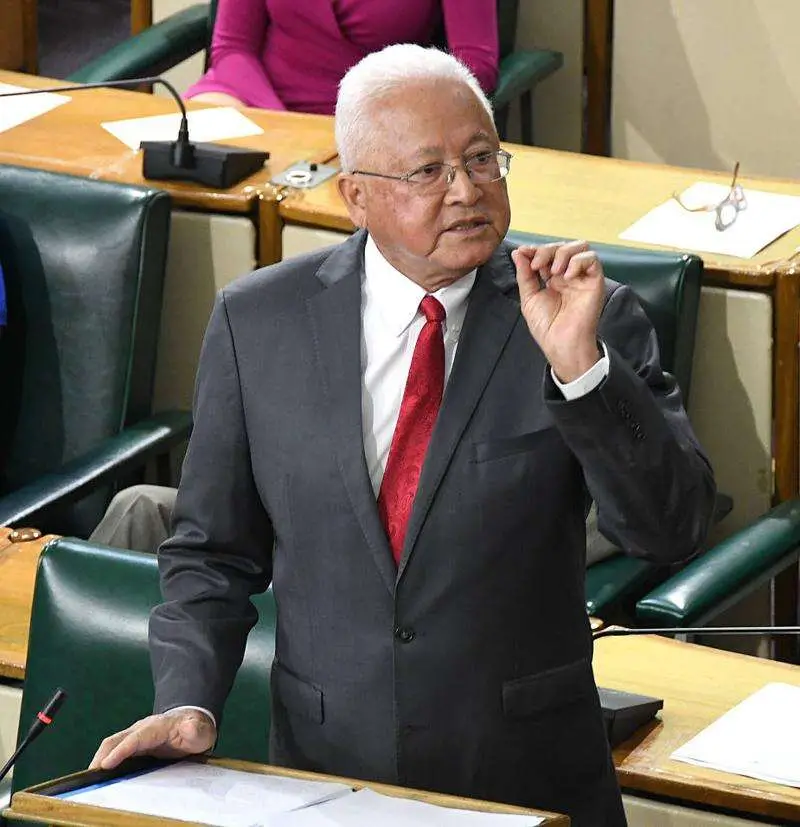
‘This Parliament must speak for them’
MINISTER of Justice Delroy Chuck is insisting that the Parliament, in formulating appropriate legislation, has a duty to speak for the victims of murder to ensure that they get justice through the imposition of harsher penalties for perpetrators of the crimes.
Chuck, who was opening the debate in Parliament on Tuesday on the report of the joint select committee which reviewed several related legislation dealing with minimum sentencing for murder, argued that the right signal has to be sent to criminals.
“At the end of the day we cannot ignore the fact that when you take life and you’re charged and convicted there is a victim who is six feet down, and even though that victim cannot speak, the families, friends, and the society at large are very concerned about what is the justice for those victims.
“And, in truth, this Parliament must reflect and balance what is justice not only for the offender but also for the victims who can’t speak. And, therefore, our Parliament must bear in mind that the victims of murder, they don’t have a voice, but this Parliament must speak for them,” he said.

Chuck contended that there are many families of victims who are frustrated with some of the sentences that have been imposed.
“I’m not blaming the courts because the courts frequently have to take into consideration many, many factors. But at the end of the day we can’t ignore what the society is calling on us as legislators as to what is appropriate for murder,” added Chuck.
The justice minister argued that the society is asking for punishment that is proportionate to the egregious nature and gravity of the criminality in the society, “and when this legislature fails to reflect what the society is asking for, we would have failed in our duties”.
In seeking to more appropriately match the crime with the punishment, the Parliament in April 2023 set up a joint select committee to consider amendments to the Offences Against the Person Act (OAPA), the Criminal Justice (Administration) Act, and the Child Care and Protection (Amendment) Act, 2023.
Among the proposed changes set out in the three pieces of related legislation is a mandatory minimum sentence of 50 years for capital murder.
Chuck said that while the penalties considered under the bills cannot by themselves solve the problems, “the increased measures, the proposed penalties are intended to send the signal that those who take life, those who contemplate taking life must appreciate that if they do and they are caught and apprehended, that…they will remain in custody for a very, very long time.
“In other words, it cannot be that those who contemplate and take life feel that they can avoid a long term of imprisonment. And there’s no doubt the intention of these amendments is to ensure that those who take life that they get their just deserts,” he said.
Chuck said the two categories for murder are capital murder — which is the most egregious of killings — and non-capital murder, which is less egregious, but oftentimes as a result of domestic violence.
He said that for capital murder the present position is either death or life imprisonment without parole, but if a life sentence is imposed, the convicted killer must serve at least 20 years before becoming eligible for parole.
The minister noted that the recommendation from the joint select committee is that the sentence for capital murder should remain death or life imprisonment, but if life imprisonment is imposed, the minimum sentence should be to serve 50 years before being eligible for parole.
For non-capital murder, Chuck said the present position is life imprisonment or a fixed term of imprisonment. If it is life imprisonment, the person must serve at least 15 years before consideration for parole. If it is a fixed term, they must serve at least 10 years before becoming eligible for parole, Chuck further explained.
He said that the proposal from the joint select committee is that for a life sentence, if it is imposed for non-capital murder, the convicted killer must serve at least 40 years before being eligible for parole. If a fixed term of imprisonment is imposed, then he or she must serve not less than 30 years, but must serve at least 20 years before becoming eligible for parole.
Chuck noted that an area of great contention during the deliberations was the issue of child murderers. He said much of the committee’s time was spent on the sentences to be imposed on children who commit murder. He said the legislation only considers children 14 to 17.
“The question is these are children of tender age, they need help, they need to be given special considerations, but the truth of the matter is these children 14 to 17 are committing some serious crimes and they’re killing similar children of a similar age and even adults,” he said.
The justice minister noted that under present law children 14 to 17 years can be sentenced like adults, but in discussion the committee determined that for capital murder a child 14 to 17 cannot be sentenced to death but could be sentenced to life imprisonment or a fixed term of 50 years.
“For life imprisonment or the fixed term, they must serve at least 20 years before they are considered for parole, that is where a child 14 to 17 has committed capital murder. Where a child 14 to 17 has committed non-capital murder, they can be sentenced to not less than 30 years, and they must serve at least 15 years before being considered for parole,” Chuck said.
He argued that though these children are of tender age they must serve at least 15 or 20 years “to send the right signal not only to the offender and the offender’s family but also to the victim’s families that justice is being done.
“We cannot just knock young offenders 14 to 17 on their wrist, we have to lock them up for a long period of time and let them reflect and improve their ways,” he said.
The debate was suspended to allow members additional time to peruse the report then make their contributions beginning next week.
























